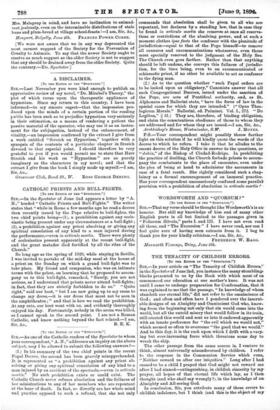[To THE EDITOR OF THE "SPECTATOR."] SIR,—As one of the
Catholic readers of the Spectator to whom your correspondent, "A. N.," addresses an inquiry on the above subject, may I be allowed to submit the following answers?— (1.) In his summary of the two chief points in the recent Papal Decree, the second has been gravely misapprehended. It is represented as "a prohibition against any priest ab- solving or giving any spiritual consolation of any kind to a man injured by an accident of the spectacle,—even in articulo mortis." No such prohibition exists or could exist. The Catholic Church never refuses absolution and the fullness of her ministrations to any of her members who are repentant at the hour of death. In fact, so directly are her whole mind and practice opposed to such a refusal, that she not only commands that absolution shall be given to all who are repentant, but declares by a standing law, that in ease they be found in articulo mortis she removes at once all reserva- tions or restrictions of the absolving power, and at such a moment clothes ipso facto the confessor with the plenitude of jurisdiction—equal to that of the Pope himself—to remove all censures and excommunications whatsoever, even those most specially reserved to the judgment of the Holy See. The Church even goes farther. Rather than that anything should be left undone, she conveys this fullness of jurisdic- tion, for the time being, even to an excommunicated or schismatic priest, if no other be available to act as confessor to the dying man.
(2.) As to the question whether "such Papal orders are to be looked upon as obligatory," Canonists answer that all such Congregational Decrees, issued under the sanction of the Pope, are acts of Pontifical authority, and, as St.. Alphonsus and Ballerini state, "have the force of law in the special cases for which they are intended." (" Opus Theo. logicum Morale." Ba,llerini, ed. Palmieri. Vol. I., 272. "De Legibus," § 31.) They are, therefore, of binding obligation, and claim the conscientious obedience of those to whom they are addressed and for whom they are issned.—I am, Sir, &c.,
Archbishop's House, Westminster, S. W. J. MOYES.
P.5.—Your correspondent might possibly throw further light on this solution if he will kindly quote the words of the decree to which he refers. I take it that he alludes to the recent decree of the Holy Office in answer to the questions, or " dubia," of the Bishop of Ciudad-Rodrigo. In prohibiting the practice of duelling, the Church forbade priests to accom- pany the combatants to the place of encounter, even under the plea of being at hand to administer the sacraments in. case of a fatal result. She rightly considered such a chap- laincy as a formal encouragement of an immoral practice. Has your correspondent unconsciously confused some parallel, provision with a prohibition of absolution in articulo mortis ?' •






































 Previous page
Previous page